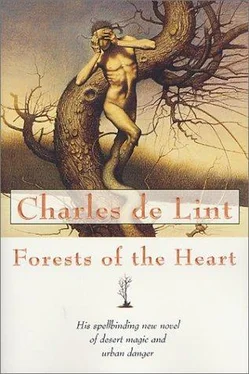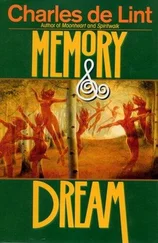“Oh, yes,” Ellie said. “And he can also get very defensive.”
“Do you think he has to work at?” Hunter asked.
She shrugged. “I hope not. Think how depressing it would be if it turned out he actually wanted to be the way he is.”
“This is true.”
“Right,” Donal said. “I’m off to the loo. Will someone hold my drink?” He held the can of Guinness out, but pulled it back when Ellie reached for it. “Never mind,” he said. “The mood you two are in, you’d probably drink it yourselves. Or give it away. Waste of a good drink, even if it does come in a can….”
He wandered off to the men’s restroom, his voice trailing along behind him. Ellie and Hunter looked at each other, then they both began to laugh.
“I think you owed him that,” Ellie said.
Hunter nodded. “Of course it won’t stop him from doing the same thing again, given half a chance.”
“Of course.”
Hunter took Donal’s place by the wall, his shoulder next to hers, and the two of them listened to the band play through a set of jigs.
“What were you saying about Miki and touring?” he asked when the applause died down.
“I was just wondering why she doesn’t. She’s so good.”
Hunter looked up at the stage where Miki had launched into an improbable story about the origin of some tune’s name.
“You see,” she was saying, “ ‘The Gravel Walk’ is actually from China, not the Shetlands. The clue’s in the misspelling of the title. It’s supposed to be w-o-k. not w-a-l-k.”
“All lies,” Geordie put in.
“No,” Miki assured the audience with a grin. “This is all true. I hope you’re taking notes. Anyway…”
“I think she’s got a phobia about traveling,” Hunter said, returning his gaze to Ellie. “You know what it was like for her growing up, staying with relatives all up and down Ireland, and then emigrating here.”
Ellie nodded. The same pattern had been repeated once the Greers had moved to North America, except they didn’t have the same extended family to fall back upon here as there had been back home. Then Miki and Donal’s mother had died giving birth to a stillborn girl and their father had taken to drinking worse than ever. He was rarely home, abusive when he was. Eventually he simply stopped working and was always home, always drunk. When they lost the last apartment they’d been living in, Miki and Donal had taken to living on the streets to escape Miki’s being put into a foster home. Miki had been fourteen, Donal six years older.
“I never saw anyone so happy as Miki was when she got that apartment with Judy,” Hunter was saying. “She was so proud of having her own place. Of having a home.”
“I guess you’ve known them longer than I have,” Ellie said.
“I suppose. I first met Miki when she was playing at one of The Harp’s sessions. Thomas would turn a blind eye when she’d sneak into the pub. I mean, she was just this raggedy little girl—all bones and thick wild hair in those days. Too young to be able to order a drink, but lord could she play.” His gaze drifted back to the stage where the band had begun another set of tunes. “I wish she would take the music further, too, but for all that she acts like such a free spirit, she’s in serious nesting mode. The very idea of having to pack up and leave—if only for a short tour—terrifies her.”
“It’s a shame,” Ellie said.
Hunter shrugged. “Well, yes and no. She’s happy the way things are now, so why should she change? Besides, there’s something to be said for playing music for the love of it, rather than it being merely the springboard towards fame and fortune.”
“I guess you see a lot of that in your business.”
“Lots of one-hit wonders,” Hunter agreed. “That’s why I admire musicians like them,” he added, nodding towards the stage. “They haven’t lost track of the music yet.”
This was reminding Ellie of her own feelings this morning, weighing commissioned work and the steady money it promised against following her own muse and being broke.
“But can’t you have both?” she said. “A career and still be true to your art?”
“Well, sure. But it only seems to work at a grassroots level. For every multi-platinum artist, there are any number of bands making far more interesting music that have trouble selling even two or three thousand copies of an album.” He shrugged. “You can still make a living at it, but you have to be willing to do most of it on your own—all those things the labels and a good manager used to be able to do for you. Promotion, setting up the tours, even getting together the money you need for recording and then pressing your CDs.”
Ellie supposed it was depressingly true for all the arts. The only thing that was different was the medium one picked to work in. Some chose music, some dance, some fine art…
Don’t focus on it, she told herself. She’d come here tonight to get away from that kind of thinking, however true it might be.
“One of the things I like about this music,” she said, to change the subject, “is how it appeals to such a diversity of people while still remaining true to itself.” She looked out at the dancers. “Yuppies and punkers, rich and poor, old and young. There’s a complete cross section of people out there on the dance floor—not to mention those who’d rather just listen. Like those guys standing at the back there. I mean, do they seem to be the sort of people you’d expect to like this music?” She laughed. “Though maybe ‘like’ is too strong a word. They don’t seem to be having much of a good time—at least not nearly so much as the dancers.”
Hunter glanced in the direction she indicated, then looked away.
“The hard men,” he said.
Ellie nodded. “That’s what Donal calls them. You see them in The Harp from time to time, and they never seem to be having any more fun there either. I wonder why they bother to come out.”
“Donal says they beat him up one night.”
“I remember. It was like some stupid macho initiation. First they beat him up, then they’re all friendly with him the next time they see him. Or what passes for friendly with that bunch. It really makes you wonder about people, doesn’t it?”
“I’m guessing that they must be carrying around a lot of anger,” Hunter said.
“But that shouldn’t be an excuse.”
“I wasn’t excusing them.”
“I didn’t think you were,” Ellie told him. “I just get frustrated about that kind of thing. I see so much of that on the streets. You wonder how all those people who must once have been so full of hope grow so lost. And angry. Some take it out on themselves, some take it out on others.”
Hunter turned to look at her. “That’s right. You’re involved with one of Angel’s projects, aren’t you?”
“Part-time. We’re the ones that drive around in the vans at night.”
“I don’t know how you can do it. Where do you find the time?”
Ellie smiled at him. “Well, it does play havoc with my social life. It seems like half the time I can’t date because we’re out in the van and the other half I’m too tired to do anything but veg at home. It doesn’t exactly make me scintillating company.”
“Is that what happened with you and…”
Hunter’s voice trailed off and he got an embarrassed look on his face.
“Me and Donal?” Ellie finished for him.
“Sorry. I didn’t mean to pry.”
“That’s okay.” Ellie looked out at the dancers again, not really seeing them, before she went on. “No, it wasn’t that. It was more that I ended up realizing we’d make better friends.” She returned her attention to Hunter. “Not that lovers shouldn’t be friends as well. I never can understand why people don’t concentrate on the friendship part of their relationship more than they do. There’d be a lot less divorces and breakups if they did.”
Читать дальше












